Join us for live, online professional development webinars this fall. In each session, learn more about assessment and instruction or intervention for young children with IFSPs and IEPs. All sessions offer opportunities to ask questions, receive resources, and learn from each other.
Courses and Tutorials
Professional Development | Recorded Webinars | Tutorials
Professional Development
The California Department of Education, Special Education Division requires DRDP training for all early childhood special educators who assess children with the DRDP. SELPAs are responsible for ensuring that all staff who administer the DRDP (2015) complete training.
- Create an account and access courses at DRAccessLearn.org
- Complete the first course, “Using the DRDP (2015) for Special Education” (including a Demonstration of Rating Skills) and all courses in subsequent years.
- Assess eligible children with the DRDP even if courses are not yet completed.
- Find more information about the DRDP assessment requirements in Appendix A of the DRDP (2015) Preschool Fundamental View Manual.
Fall 2025 Online Professional Development Schedule
Required DRDP Assessor Training for Special Education
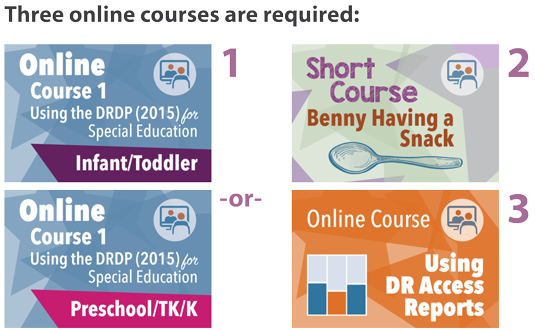 List of required courses available on DR Access Learn. California Department of Education, Special Education Division, requires DRDP training for all special educators who assess children with the DRDP.
List of required courses available on DR Access Learn. California Department of Education, Special Education Division, requires DRDP training for all special educators who assess children with the DRDP.
Recorded Webinars
Learn Lab: Planning Instruction Using DRDP Results Fall 2024
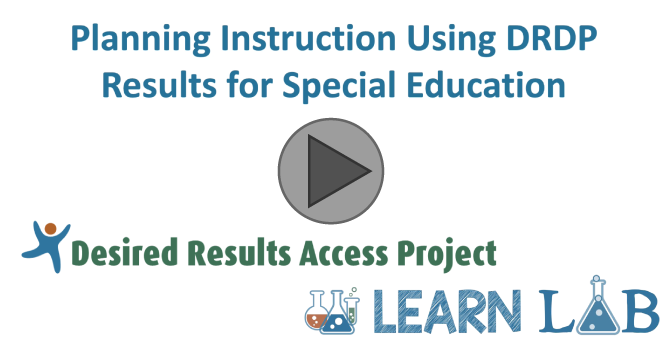 This recorded webinar demonstrates how the DRDP informs present levels of performance or development on the IEP or IFSP, breaking down long term goals into next steps in instruction, and connections to the California Early Learning Foundations. Also highlights how the authentic assessment process used to complete the DRDP, along with the resulting reports, provides a rich profile of a child’s learning and development. (36:05)
This recorded webinar demonstrates how the DRDP informs present levels of performance or development on the IEP or IFSP, breaking down long term goals into next steps in instruction, and connections to the California Early Learning Foundations. Also highlights how the authentic assessment process used to complete the DRDP, along with the resulting reports, provides a rich profile of a child’s learning and development. (36:05)
New Assessors: Getting Started with the DRDP
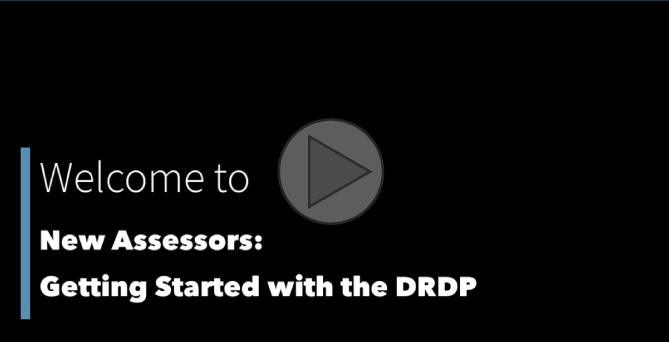 Essential information and resources for using the DRDP with children with Individualized Family Service Plans (IFSPs) and Individualized Education Programs (IEPs). Questions answered at the end. (36:41)
Essential information and resources for using the DRDP with children with Individualized Family Service Plans (IFSPs) and Individualized Education Programs (IEPs). Questions answered at the end. (36:41)
Using the DRDP in TK/K
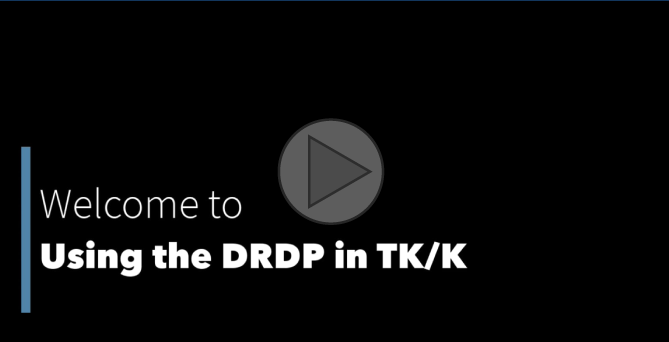 Are you new to using the DRDP to assess young children in Transitional Kindergarten (TK) and Kindergarten (K)? Would it be helpful to learn strategies to support quality assessment? In this recorded webinar, the DR Access Team answered questions and shared essential information and resources for using the DRDP with children with Individualized Education Programs (IEPs) in TK and K. (37:38)
Are you new to using the DRDP to assess young children in Transitional Kindergarten (TK) and Kindergarten (K)? Would it be helpful to learn strategies to support quality assessment? In this recorded webinar, the DR Access Team answered questions and shared essential information and resources for using the DRDP with children with Individualized Education Programs (IEPs) in TK and K. (37:38)
Learn Lab: Using DRDP Reports
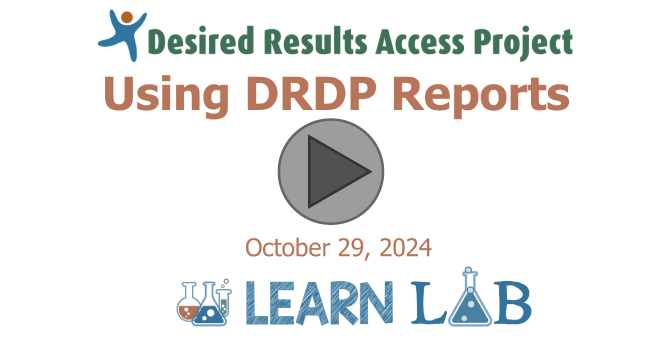 In this recorded Learn Lab session we cover the suite of DRDP reports available for special education to prepare you to use the reports for planning. Learn about the DR Access Reports website, Child Reports, Peer Reference Reports, and Guidance on using and sharing reports. (44:48)
In this recorded Learn Lab session we cover the suite of DRDP reports available for special education to prepare you to use the reports for planning. Learn about the DR Access Reports website, Child Reports, Peer Reference Reports, and Guidance on using and sharing reports. (44:48)
Sharing the DRDP with Families
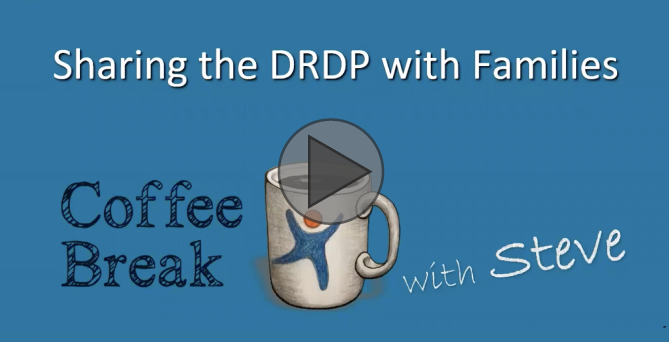 Families can participate in the DRDP in several ways. Watch this short Coffee Break recording to learn ways assessors to engage with families related to the DRDP including using adaptations, discussing child development, and reviewing assessment results. (12:48)
Families can participate in the DRDP in several ways. Watch this short Coffee Break recording to learn ways assessors to engage with families related to the DRDP including using adaptations, discussing child development, and reviewing assessment results. (12:48)
Using the Foundations in Inclusive Settings with Guest Speaker Tamarra Barrett-Osborne
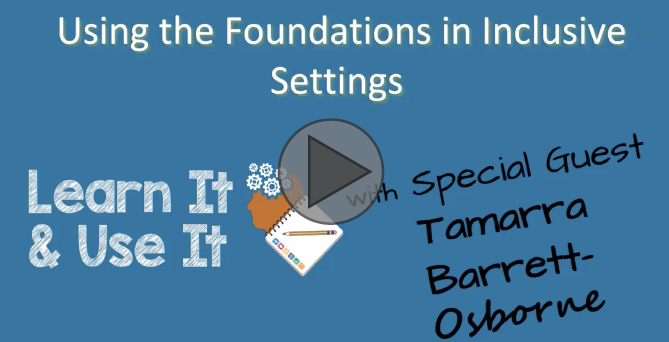 Explore strategies for linking the California Preschool Learning Foundations and DRDP authentic assessment information to support child development and learning in inclusive preschool classrooms. (27:42)
Explore strategies for linking the California Preschool Learning Foundations and DRDP authentic assessment information to support child development and learning in inclusive preschool classrooms. (27:42)
Breaking It Down: Identifying Learning Targets for DRDP Results
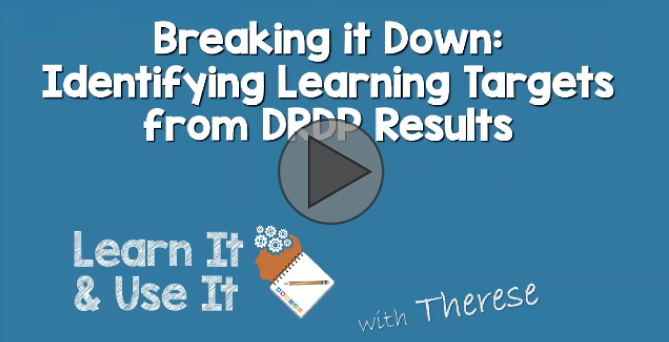 Are you providing instruction to a child on an IEP goal or related to a DRDP measure? In this Learn It & Use It session we practiced breaking it down into proximal learning targets using the authentic assessment information from the DRDP to determine what knowledge, skills, or behaviors to teach in daily activities, routines, and transitions for children with IFSPs and IEPs. (49:29)
Are you providing instruction to a child on an IEP goal or related to a DRDP measure? In this Learn It & Use It session we practiced breaking it down into proximal learning targets using the authentic assessment information from the DRDP to determine what knowledge, skills, or behaviors to teach in daily activities, routines, and transitions for children with IFSPs and IEPs. (49:29)
Learn Lab: Using the DRDP to Measure Child Progress
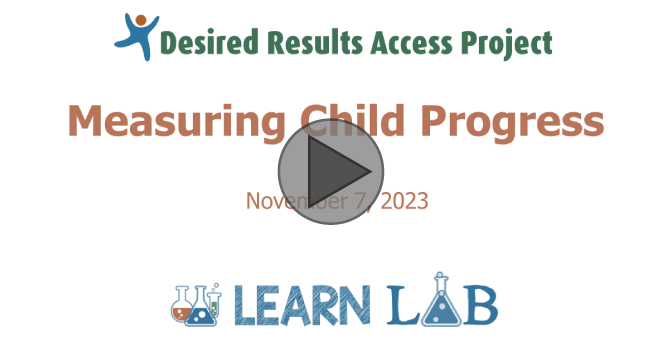 Features strategies for using the DRDP and DR Access Reports to identify and measure the developmental and learning progress of children with IFSPs and IEPs. (22:26)
Features strategies for using the DRDP and DR Access Reports to identify and measure the developmental and learning progress of children with IFSPs and IEPs. (22:26)
Producing and Using Peer Reference Report
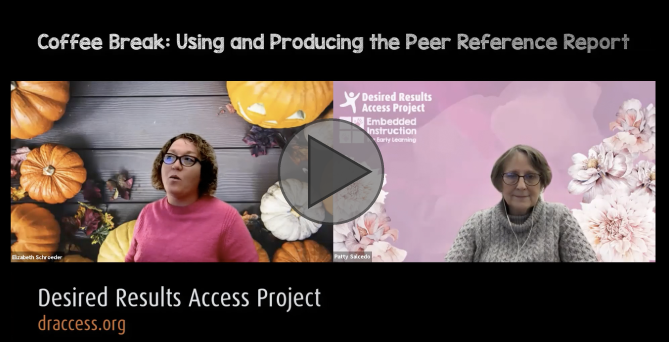 Learn about the Peer Reference Report, available from DR Access Reports, from this short, recorded webinar. (12:19)
Learn about the Peer Reference Report, available from DR Access Reports, from this short, recorded webinar. (12:19)
DR Access Outcomes: your data for federal child outcomes
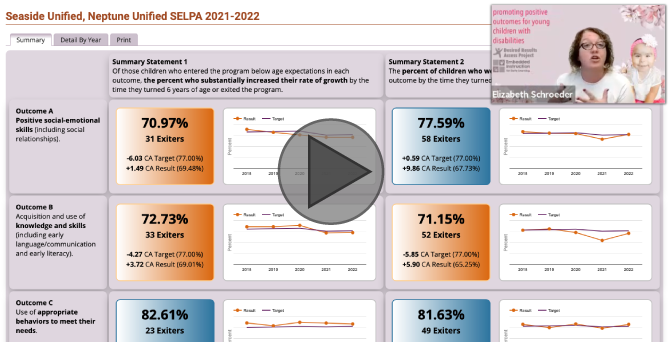 Did you know that DRDP results are used to report on federal preschool child outcomes? In this Learn It & Use It session we walk through our new online tool to find your district or SELPA’s results. (42:27)
Did you know that DRDP results are used to report on federal preschool child outcomes? In this Learn It & Use It session we walk through our new online tool to find your district or SELPA’s results. (42:27)
Tutorials
DRDP Timeline for Special Education
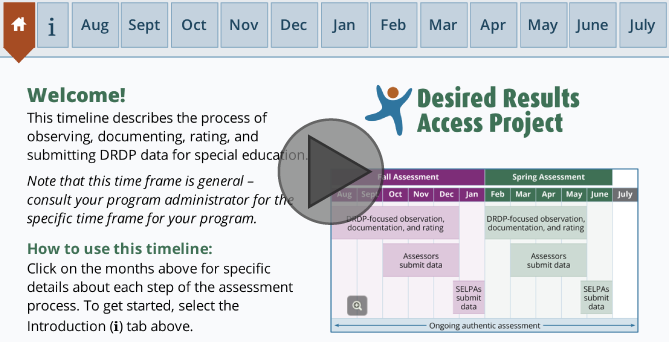 This interactive timeline describes the process of observing, documenting, rating, and submitting DRDP data for special education.
This interactive timeline describes the process of observing, documenting, rating, and submitting DRDP data for special education.
Understanding the Measures of the DRDP (2015)
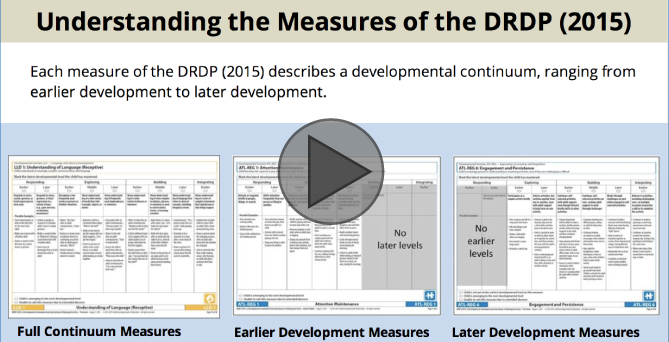 An interactive tutorial illustrating the measures of the DRDP (2015). Each measure of the DRDP (2015) describes a developmental continuum, ranging from earlier development to later development. There are three types of continua.
An interactive tutorial illustrating the measures of the DRDP (2015). Each measure of the DRDP (2015) describes a developmental continuum, ranging from earlier development to later development. There are three types of continua.
DRDP (2015) Special Education Information Page Tutorial
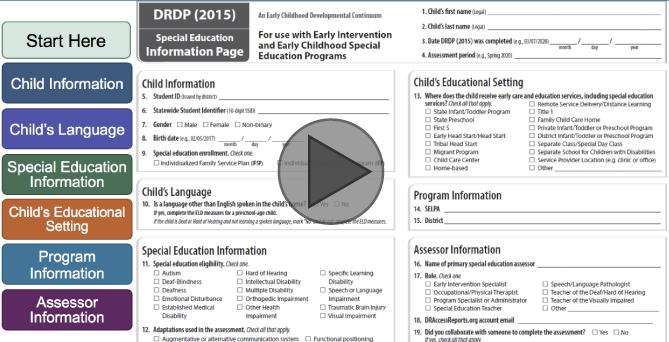 Quickly learn about the changes made to the DRDP Information Page for special education beginning fall, 2020.
Quickly learn about the changes made to the DRDP Information Page for special education beginning fall, 2020.
Using Adaptations with the DRDP (2015) Tutorial
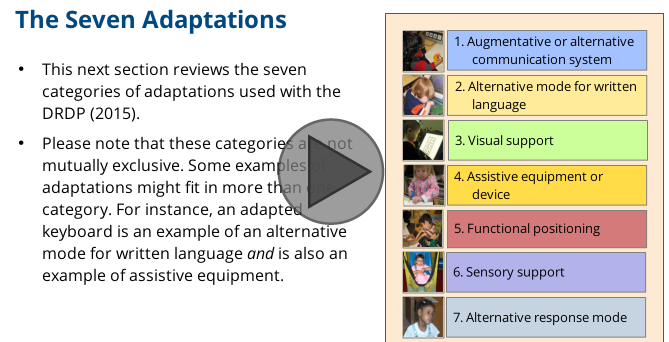 This interactive tutorial describes what adaptations are, how they can help us more accurately assess children’s skills as we observe their daily activities, and provides a variety of examples of the seven adaptations used for the DRDP.
This interactive tutorial describes what adaptations are, how they can help us more accurately assess children’s skills as we observe their daily activities, and provides a variety of examples of the seven adaptations used for the DRDP.
Planning Adaptations for Distance Learning
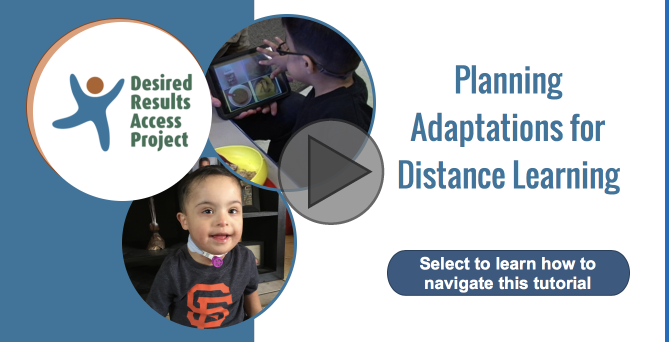 Learn about adaptations for preschool children with IEPs (Individualized Education Programs) by meeting our friend Augie and his teacher, Ms. Keisha. You will see examples of adaptations used in distance learning and you can download guidance and a worksheet to help you and your team plan adaptations for your students.
Learn about adaptations for preschool children with IEPs (Individualized Education Programs) by meeting our friend Augie and his teacher, Ms. Keisha. You will see examples of adaptations used in distance learning and you can download guidance and a worksheet to help you and your team plan adaptations for your students.
